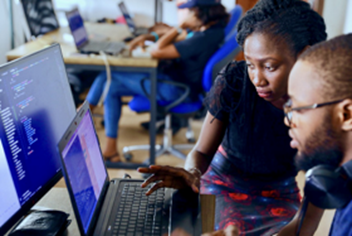Meet the volunteers translating COVID-19 information into African languages

Since the start of the COVID-19 pandemic, there has been a huge amount of new and rapidly changing coronavirus information released by governments, businesses and health officials. From government guidelines and financial support to hygiene measures from the World Health Organization.
This type of information can be hard for anyone to navigate, even more so if English isn't the first language. Imagine not being able to easily access this information on the internet or not being able to read it in your native tongue. This is a reality for many people across Africa and other countries worldwide.
More COVID-19 information in African languages is needed
For many, especially those who live in rural or remote locations in African countries, getting internet access can be a challenge. But even with reliable internet access, getting the information needed in a native language is not always possible.
Professional language translators are the most efficient and reliable option for accurately translating information, however not all online service providers are providing on-demand professional translations services on their websites or providing translations options for rare African Languages. This has led to individuals depending on others to translate the information for them and therefore run the risk of misinformation. Or they use instant online translation services, like Google translate, which often aren't accurate.
Volunteer translators are translating COVID-19 information online into African Languages
The issue of unequal access to online information is known as the digital divide which separates people who can't access information and opportunities on the internet. COVID-19 has highlighted this digital divide.
People may be missing out on key details around vaccinations and government restrictions, information that needs to be communicated quickly and updated regularly. That's why since the start of the pandemic, volunteers at WikiAfrica have been making it a priority to translate COVID-19 information into regional African languages to make it accessible and relevant to local communities.
WikiAfrica Education launched the Moleskine Foundation in 2006 which is a not-for-profit organization that focuses on cultural projects and training translators in Africa. So far, the organization has translated up to 40,000 written pieces of content into African languages including Afrikaans, Dagbani, Swahili and Twi. WikiAfrica also provides Wikipedia with imagery, videos and audio clips and their content has been viewed over 500,000 times to date.
WikiAfrica isn't the only project that is creating culturally relevant content for different communities across Africa. In Nigeria for example, the United Nations developed a COVID-19 misinformation portal to answer frequently asked questions from people in Igbo, Hausa and Yoruba. Also, at the University of Cambridge, researcher Ebele Mogo requested help from translators on social media to translate COVID-19 public health guidelines into 18 of the most widely used languages in Africa.
How Vandu's language translators and interpreters are breaking communication barriers around COVID-19
At Vandu Language services we commend organisations like these and we too are committed to supporting our local communities and partners in Africa. Our translators, interpreters, and bilingual advocates work with health organizations like the NHS so people can access the information they need, ask questions and express any concerns. They use our language translation services in languages such as Wolof, spoken in Senegal and Gambia, and Amharic and Tigrinya from Eritrea and Ethiopia.
"It's very important for people who speak different languages to have equal access to essential information," says Eren Wanas, one of our interpreters at Vandu Languages. The news recently highlighted how false information about the COVID-19 vaccine has spread among ethnic minority communities. By providing ethnic communities with all the essential information in their own languages, they are able to access the correct facts and build trust and confidence in the vaccine.
Our interpreters and translators at Vandu can help with over 135 languages including regional African dialects. If you are specifically looking for African language translation services or African language interpreting services, we can support your organisation.
Contact us
At Vandu Languages, we work with a wide range of service providers to help people share and access essential information and services in their target language. Feel free to contact us to learn about our translation, interpreting, and bilingual advocacy services.
